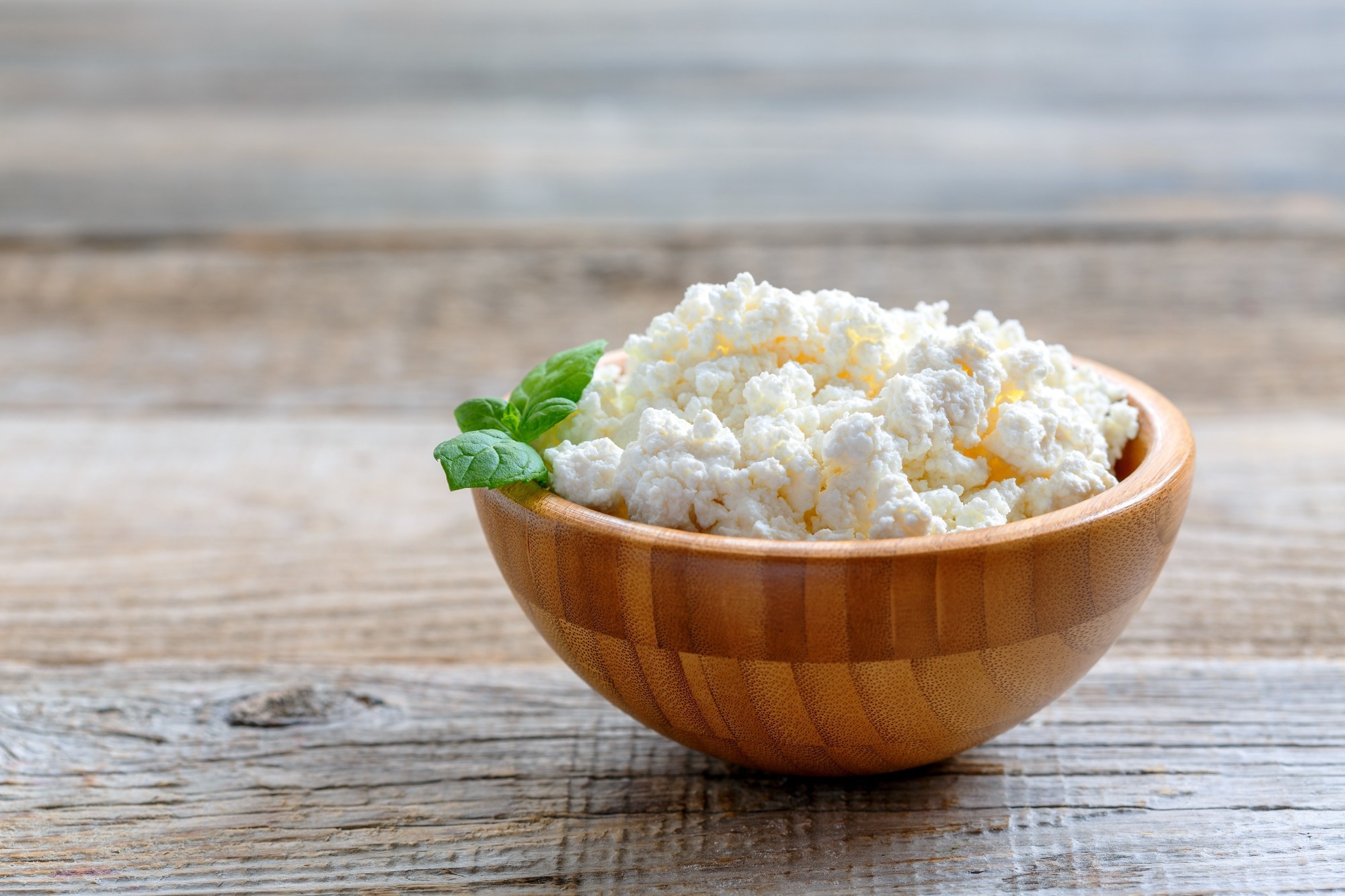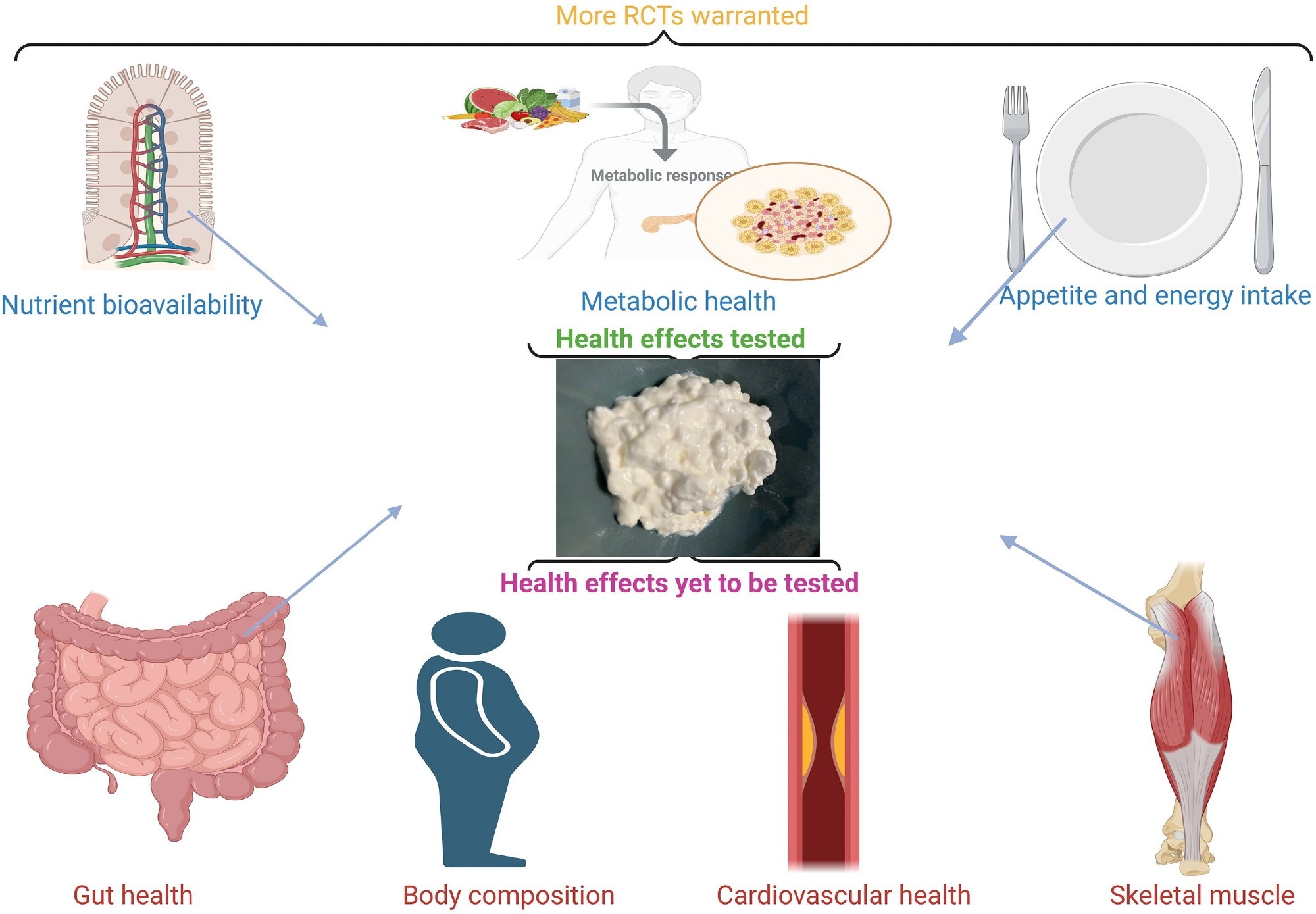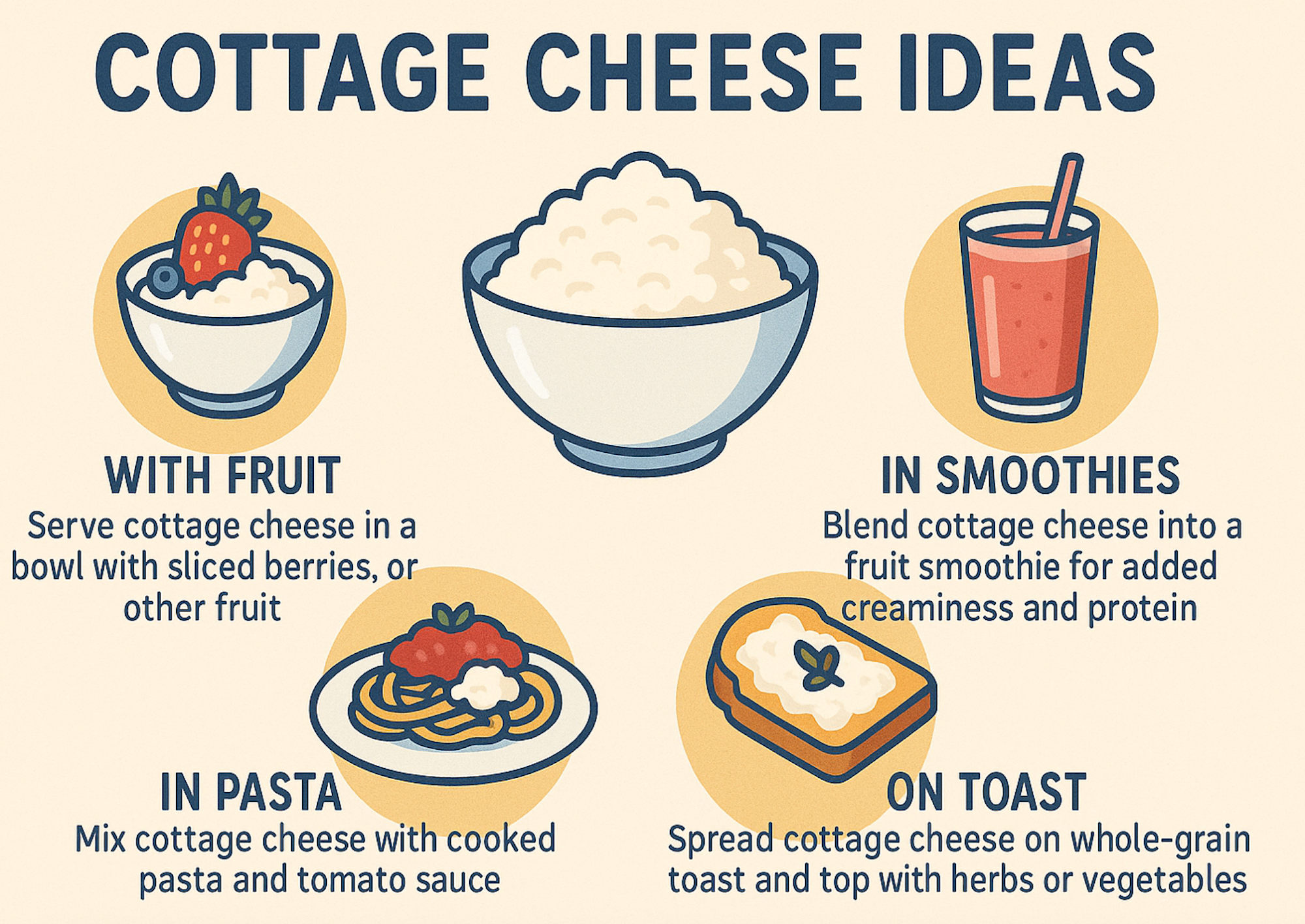Introduction
Nutritional Profile of Cottage Cheese
How Cottage Cheese Supports Weight Loss
How to Add Cottage Cheese to Your Diet
Choosing the Right Type
Scientific Evidence
Important Considerations
Conclusions
References
Once a humble dairy staple, cottage cheese is making a powerful comeback; its unique blend of slow-digesting protein, low calorie density, and muscle-preserving benefits may make it a game-changer in weight management strategies backed by science.
 Image Credit: Supranova Marina / Shutterstock
Image Credit: Supranova Marina / Shutterstock
Introduction
In recent years, there has been a surge in the popularity of high-protein diets and whole-food-based nutrition trends, particularly among individuals aiming for effective and sustainable weight loss. Cottage cheese, once considered a modest dietary choice, has reemerged as a nutritional powerhouse across social media, fitness platforms, and clinical dietary recommendations.1-3
This article critically examines the potential of cottage cheese to support weight loss and analyzes its nutritional composition, satiety effects, metabolic advantages, and scientific evidence from peer-reviewed literature to provide an objective, evidence-based overview.
Nutritional Profile of Cottage Cheese
Cottage cheese is classified as a fresh cheese, typically consumed without an aging process. This dairy product is made through acid or rennet-induced coagulation of pasteurized milk, which results in clumps or curds.1
For every 100 grams, standard low-fat cottage cheese provides approximately:
- Protein: 10-13 grams (mainly casein)
- Calories: Approximately 98 kcal
- Fat: 2.3-3.9 grams (lower in non-fat variants)
- Carbohydrates: 2.1-4.3 grams (primarily lactose)
- Calcium: ~73-123 mg
- Vitamins: B-complex, especially B12, riboflavin, and niacin, as well as modest amounts of vitamin A and D
- Essential minerals: Phosphorus, approximately 80 mg of calcium, selenium, and potassium2,4,5
As compared to other dairy products like Greek yogurt or ricotta, cottage cheese offers lower fat content while maintaining high-quality protein content, particularly in casein, a slow-digesting protein that supports satiety and muscle preservation.1,2
 Summary of the health effects tested and health effects yet to be tested pertaining to cottage cheese. To date, investigations have been performed on the effects of cottage cheese on nutrient bioavailability, metabolic health, appetite, and energy intake; although further randomized controlled trials are warranted due to investigations being performed in small, niche study populations. There have been no investigations of the impact of cottage cheese on gut health, body composition metrics such as weight loss, cardiovascular health and skeletal muscle, investigations which are arguably warranted to garner a detailed picture of the impact of cottage cheese in health.1
Summary of the health effects tested and health effects yet to be tested pertaining to cottage cheese. To date, investigations have been performed on the effects of cottage cheese on nutrient bioavailability, metabolic health, appetite, and energy intake; although further randomized controlled trials are warranted due to investigations being performed in small, niche study populations. There have been no investigations of the impact of cottage cheese on gut health, body composition metrics such as weight loss, cardiovascular health and skeletal muscle, investigations which are arguably warranted to garner a detailed picture of the impact of cottage cheese in health.1
How Cottage Cheese Supports Weight Loss
Promotes Satiety
Recent studies suggest that high-protein diets increase the release of satiety hormones such as glucagon-like peptide-1 (GLP-1) and Peptide YY (PYY), thereby reducing appetite. The high protein content of cottage cheese has been shown to reduce cravings and total caloric intake by promoting fullness for longer periods.1,4
In a clinical setting, high-protein dairy foods, including cottage cheese, have been shown to reduce postprandial glucose levels and improve satiety in both healthy and diabetic individuals.2,4
Preserves Lean Muscle Mass
During calorie restriction, preserving lean muscle mass is critical for metabolic health and sustained fat loss. The high casein content in cottage cheese prolongs amino acid release during its slow digestion, which prevents muscle breakdown and promotes muscle protein synthesis.1,4
When combined with resistance training, the sustained nitrogen balance from casein may also enhance recovery and improve body composition. Emerging evidence suggests that high-protein diets protect muscle mass and contribute to greater fat mass reduction.1,6
Low Calorie Density
Cottage cheese is a nutrient-dense food with relatively few calories per gram, which makes it ideal for those seeking satiety without excessive caloric intake. Foods with low-calorie density increase meal volume and satisfaction while reducing total energy consumption.
A 100 g serving of non-fat cottage cheese provides about 72 kcal yet delivers over 10 g of high-quality protein. Regularly consuming high-quality protein foods has been linked to improved adherence to calorie-restricted diets and more sustainable weight loss outcomes.2
Metabolic Boost
Protein has a higher thermic effect of food (TEF) than carbohydrates or fats, leading to more calories burned during digestion and metabolism. Casein, the predominant protein in cottage cheese, requires sustained digestive effort, contributing to increased post-meal energy expenditure. Although the effect is modest on its own, it can support total daily energy burn when combined with an active lifestyle.1
The inclusion of high-protein dairy has been associated with favorable changes in metabolic markers, such as improved insulin sensitivity and better blood glucose regulation.1,6
How to Add Cottage Cheese to Your Diet
For savory dishes, cottage cheese can be mixed with chopped herbs, black pepper, and cherry tomatoes for a protein-rich dip or spread on whole-grain toast with avocado and red pepper flakes. It can also be added to scrambled eggs or baked into a crustless quiche to increase the protein content of breakfast. Cottage cheese can also be used to stuff bell peppers or as a topping on grain bowls.
For those who prefer sweeter dishes, cottage cheese can be blended with cinnamon, vanilla extract, and a handful of berries for a satisfying snack or used as a replacement for yogurt in smoothies for extra creaminess. It can also be folded into pancake batter for a protein-enhanced breakfast or layered with fruit and nuts as a parfait.

Cottage cheese can be incorporated into all meals. For example, consuming cottage cheese at breakfast can provide sustained energy, whereas a post-workout snack containing cottage cheese is good for muscle recovery.
Emerging research also suggests that consuming cottage cheese or casein-rich foods before sleep does not impair resting energy expenditure or have a negative impact on energy intake, resting metabolic rate, or the following day’s appetite across various populations, including older adults and women. Therefore, incorporating cottage cheese into dinners may offer benefits for muscle maintenance and overnight protein synthesis without negatively affecting metabolism or appetite.7,8
Choosing the Right Type
Cottage cheese is available in full-fat, low-fat, and non-fat versions. Full-fat cottage cheese may provide greater satiety; however, it is also higher in calories, whereas fat-free variants often sacrifice texture and taste without substantial calorie savings.1
Flavored cottage cheese products commonly contain added sugars and artificial ingredients that may counteract weight loss efforts. Therefore, organic or minimally processed products are ideal, as they retain more bioavailable micronutrients and avoid unnecessary additives.1
Scientific Evidence
Although direct studies on cottage cheese remain limited, broader research on protein-rich diets is promising. For example, a recent comprehensive umbrella review found that dairy protein, especially casein, may improve appetite regulation, reduce fat mass, and support lean body mass during energy restriction.6
Previous studies have indicated that cottage cheese consumption leads to reduced postprandial glucose levels in both healthy and diabetic subjects and a lower risk of cardiovascular disease in epidemiological studies.2 Despite these findings, there remains a lack of high-quality randomized controlled trials specific to cottage cheese.
Important Considerations
Although lower in lactose than milk, cottage cheese may still cause digestive issues in lactose-intolerant individuals. Therefore, lactose-free alternatives or small portion testing are advisable. Some cottage cheese products are also high in sodium, which may be excessive for individuals managing hypertension or cardiovascular risk.2,5
Since cottage cheese lacks dietary fiber, it should be served with fruits, vegetables, or whole grains to ensure a balanced nutrient profile. Even low-calorie foods can lead to weight gain if overeaten; therefore, 100-120 g of cottage cheese is typically recommended for snacks or meal components.2
Conclusions
Cottage cheese is a nutrient-dense and high-protein food that aligns well with weight loss goals, particularly within whole-food, calorie-conscious dietary patterns. Consuming cottage cheese provides satiety, supports lean muscle maintenance, and contributes to a favorable metabolic profile, all of which are critical for sustainable weight management.
To maximize its benefits, cottage cheese should be incorporated into a balanced diet rich in fiber and whole foods, along with a broader healthy lifestyle that includes balanced nutrition, regular physical activity, and adequate sleep.
References
- Farsi, D. N., Mathur, H., Beresford, T., & Cotter, P. D. (2025). Cottage cheese, a relatively underexplored cultured dairy product with potential health benefits?. Critical Reviews in Food Science and Nutrition, 1–11. Advance online publication. DOI:10.1080/10408398.2025.2487682, https://www.tandfonline.com/doi/full/10.1080/10408398.2025.2487682
- Pozzobon, V. and Pozzobon, C. (2019). Cottage cheese in a diet – a review. Nutrition & Food Science, Vol. 49 No. 6, pp. 1265-1274. DOI:10.1108/NFS-03-2019-0073, https://www.emerald.com/insight/content/doi/10.1108/nfs-03-2019-0073/full/html
- Leyh, S. M., Willingham, B. D., Baur, D. A., Panton, L. B., & Ormsbee, M. J. (2018). Pre-sleep protein in casein supplement or whole-food form has no impact on resting energy expenditure or hunger in women. The British Journal of Nutrition, 120(9), 988–994. DOI:10.1017/S0007114518002416, https://www.cambridge.org/core/journals/british-journal-of-nutrition/article/presleep-protein-in-casein-supplement-or-wholefood-form-has-no-impact-on-resting-energy-expenditure-or-hunger-in-women/FA272FC2E0B8C9FF85C6DA0918EDFEB7
- Cleveland Clinic. (2023, August 23). 7 Reasons Why Cottage Cheese Is Good for You. Cleveland Clinic. https://health.clevelandclinic.org/cottage-cheese-benefits
- UCLA Health. (2024, December 5). 5 cottage cheese benefits — and how to add more to your diet. Uclahealth.org; UCLA Health. https://www.uclahealth.org/news/article/5-cottage-cheese-benefits-and-how-add-more-your-diet
- Zhang, M., Dong, X., Huang, Z., Li, X., Zhao, Y., Wang, Y., Zhu, H., Fang, A., & Giovannucci, E. L. (2023). Cheese consumption and multiple health outcomes: an umbrella review and updated meta-analysis of prospective studies. Advances in Nutrition (Bethesda, Md.), 14(5), 1170–1186. DOI:10.1016/j.advnut.2023.06.007, https://www.sciencedirect.com/science/article/pii/S2161831323013285
- Morehen, S., Smeuninx, B., Perkins, M., Morgan, P., & Breen, L. (2019). Pre-Sleep Casein Protein Ingestion Does Not Impact Next-Day Appetite, Energy Intake and Metabolism in Older Individuals. Nutrients, 12(1), 90. DOI:10.3390/nu12010090, https://www.mdpi.com/2072-6643/12/1/90
Last Updated: May 12, 2025